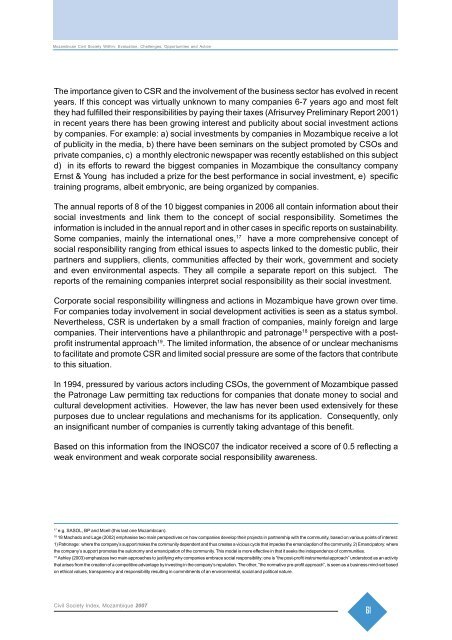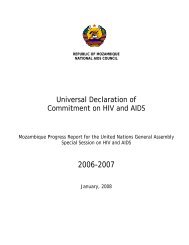Mozambican Civil Society Within: - UNICEF Mozambique - Home page
Mozambican Civil Society Within: - UNICEF Mozambique - Home page
Mozambican Civil Society Within: - UNICEF Mozambique - Home page
Create successful ePaper yourself
Turn your PDF publications into a flip-book with our unique Google optimized e-Paper software.
<strong>Mozambican</strong> <strong>Civil</strong> <strong>Society</strong> <strong>Within</strong>: Evaluation, Challenges, Opportunities and Action<br />
The importance given to CSR and the involvement of the business sector has evolved in recent<br />
years. If this concept was virtually unknown to many companies 6-7 years ago and most felt<br />
they had fulfilled their responsibilities by paying their taxes (Afrisurvey Preliminary Report 2001)<br />
in recent years there has been growing interest and publicity about social investment actions<br />
by companies. For example: a) social investments by companies in <strong>Mozambique</strong> receive a lot<br />
of publicity in the media, b) there have been seminars on the subject promoted by CSOs and<br />
private companies, c) a monthly electronic newspaper was recently established on this subject<br />
d) in its efforts to reward the biggest companies in <strong>Mozambique</strong> the consultancy company<br />
Ernst & Young has included a prize for the best performance in social investment, e) specific<br />
training programs, albeit embryonic, are being organized by companies.<br />
The annual reports of 8 of the 10 biggest companies in 2006 all contain information about their<br />
social investments and link them to the concept of social responsibility. Sometimes the<br />
information is included in the annual report and in other cases in specific reports on sustainability.<br />
Some companies, mainly the international ones, 17 have a more comprehensive concept of<br />
social responsibility ranging from ethical issues to aspects linked to the domestic public, their<br />
partners and suppliers, clients, communities affected by their work, government and society<br />
and even environmental aspects. They all compile a separate report on this subject. The<br />
reports of the remaining companies interpret social responsibility as their social investment.<br />
Corporate social responsibility willingness and actions in <strong>Mozambique</strong> have grown over time.<br />
For companies today involvement in social development activities is seen as a status symbol.<br />
Nevertheless, CSR is undertaken by a small fraction of companies, mainly foreign and large<br />
companies. Their interventions have a philanthropic and patronage 18 perspective with a postprofit<br />
instrumental approach 19 . The limited information, the absence of or unclear mechanisms<br />
to facilitate and promote CSR and limited social pressure are some of the factors that contribute<br />
to this situation.<br />
In 1994, pressured by various actors including CSOs, the government of <strong>Mozambique</strong> passed<br />
the Patronage Law permitting tax reductions for companies that donate money to social and<br />
cultural development activities. However, the law has never been used extensively for these<br />
purposes due to unclear regulations and mechanisms for its application. Consequently, only<br />
an insignificant number of companies is currently taking advantage of this benefit.<br />
Based on this information from the INOSC07 the indicator received a score of 0.5 reflecting a<br />
weak environment and weak corporate social responsibility awareness.<br />
17<br />
e.g. SASOL, BP and Mcell (this last one <strong>Mozambican</strong>).<br />
18<br />
18 Machado and Lage (2002) emphasise two main perspectives on how companies develop their projects in partnership with the community, based on various points of interest:<br />
1) Patronage: where the company’s support makes the community dependent and thus creates a vicious cycle that impedes the emanciaption of the community. 2) Emancipatory: where<br />
the company’s support promotes the autonomy and emancipation of the community. This model is more effective in that it seeks the independence of communities.<br />
19<br />
Ashley (2003) emphasizes two main approaches to justifying why companies embrace social responsibility: one is “the post-profit instrumental approach” understood as an activity<br />
that arises from the creation of a competitive advantage by investing in the company’s reputation. The other, “the normative pre-profit approach”, is seen as a business mind-set based<br />
on ethical values, transparency and responsibility resulting in commitments of an environmental, social and political nature.<br />
<strong>Civil</strong> <strong>Society</strong> Index, <strong>Mozambique</strong> 2007<br />
61
















